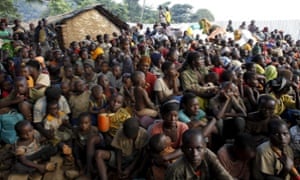
They are coming in their thousands, a steady stream of men, women and children bearing what few possessions they can carry as they flee their native Burundi and the pro-government militias who they fear are intent on death and destruction.
At Kagunga, a tiny fishing village on the shores of Lake Tanganyika just 2km (1.5 miles) inside Tanzania, an estimated 50,000 refugees are sleeping rough, waiting for a 100-year-old ferry, the MV Liemba, to carry them south to safety.
Conditions in the makeshift camp are dire, with families forced to sleep on the dirt; plastic sheets and tarpaulins provide their only protection from the elements. To eat, they cook meagre rations on open fires.
According to the UN refugee agency, the UN high commissioner for refugees (UNHCR), more than 110,000 people so far have fled a political crisis that many fear could descend into another bout of ethnic bloodletting in the heart of Africa’s Great Lakes region.
Most of them have gone south to Tanzania, but 27,000 have sought safety to the north in Rwanda, which is still recovering from the 1994 genocide in which 800,000 ethnic Tutsis and moderate Hutus were killed. A further 9,000 people have headed to the Democratic Republic of the Congo.
In Kagunga, seven people have died since the evacuees started arriving, the UNHCR said. After a failed coup in Burundi last week, few expect the flow of people to slow. Of the dead, two people are suspected to have been victims of cholera, while 300 others are suffering from acute diarrhoea, said the UNHCR, suggesting that the death toll could climb.
The ferry, which was first used by the German imperial navy to patrol Lake Tanganyika in 1915, can carry 600 people but cannot dock at Kagunga, meaning that passengers have to be transported from there by fishing boat, a process that takes 10 hours.
The only other way out of the village is a four-hour trek to another village up through the dense jungle on cliffs abutting the lake, part of Africa’s Great Rift Valley.
“The situation is very difficult. We’ve stepped up efforts to move people away by trying to rehabilitate a mountain track so that at least they can walk out, but it’s a strenuous hike,” said UNHCR spokeswoman Karin de Gruijl
More than 2,000 people are arriving at Kagunga each day, more than the ferry can handle. They are united in fear of the youth militias known as Imbonerakure, who are loyal to President Pierre Nkurunziza, the man whose bid for a third term has triggered the crisis.
Just 10 years after the end of a civil war between ethnic Hutus and Tutsis in which 300,000 people died, any sign that the Imbonerakure are flexing their muscles is enough to sow panic.
“The reason there are so many people here is because we didn’t feel secure back at home because Imbonerakure were going around threatening people and saying they were going to finish them [off],” a refugee who did not want to be named told Reuters.
“This went on for a while … And then things got worse because we heard about what was happening in the capital.”
In Rwanda’s refugee centres, some Tutsis said they had fled an expected backlash from Nkurunziza’s security forces after last week’s attempted coup by generalsopposed to his plans to prolong his presidential term.
“I heard that the coup had failed so I was afraid that the Imbonerakure could retaliate,” said Hakizimana Leonidas, a 46-year-old Tutsi who arrived in the Gashora refugee camp at the weekend. “They tried a coup and it failed. I think its going to be worse for us who don’t want to see Nkurunziza run again.”
“I have a fiancée in Burundi but because of the terror by Imbonerakure I had to run away,” said 27-year-old Jean Berchimas Dukuzemungu, the son of a Tutsi father and Hutu mother. “When you are young and you’re not in their party, you are in danger.”